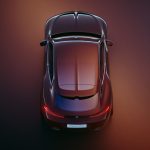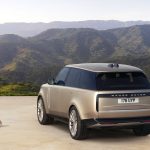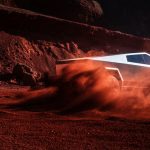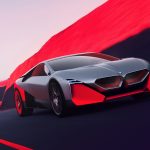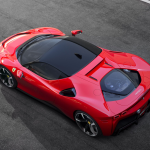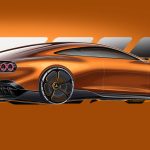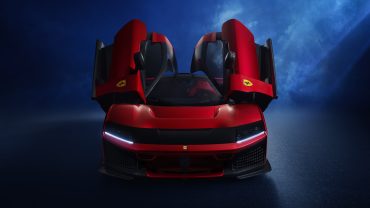
- Earnings Season
- Mobility Tech
- Stock Market
Ferrari F80 Sparks Deutsche Bank Upgrade, Earnings Boost
5 minute read

Ferrari’s F80 supercar development drives Deutsche Bank upgrade as analysts project €450 million earnings boost for 2026
Key Takeaways
- Deutsche Bank upgrades Ferrari to “buy” with €520 price target from previous “hold” rating and €430 target, citing the upcoming F80 supercar’s potential to boost earnings by over €450 million in 2026.
- F80 supercar commands $3.7 million price with 799 units planned featuring 1,200 horsepower hybrid system and Formula 1-derived technology, representing Ferrari’s most powerful road car to date.
- Ferrari shares gain 1.6% following upgrade as analysts project the F80’s impact could drive earnings forecasts upgrades of around 5% for 2026, currently not reflected in consensus estimates.
Introduction
Deutsche Bank elevates Ferrari N.V. to “buy” status while raising its price target to €520 from €430, driven by expectations surrounding the Italian automaker’s upcoming F80 supercar. According to Ferrari shares respond positively with a 1.6% increase at 05:12 ET.
The upgrade reflects major developments in Ferrari’s product strategy and financial outlook. Analyst Nicolai Kempf anticipates the company’s Capital Markets Day in October will reveal ambitious mid-term targets, including adjusted EBIT margins potentially exceeding 30% alongside a substantial €3 billion share buyback program.
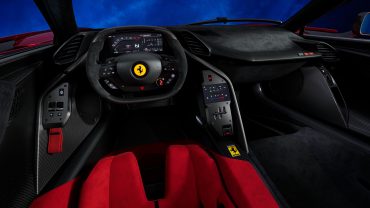
Key Developments
Ferrari’s F80 represents a significant technological advancement in the luxury automotive sector. The supercar combines a 3.0L twin-turbo V6 engine with three electric motors, generating a total output of 1,200 PS (1,184 hp) and establishing it as Ferrari’s most powerful road-going vehicle.
Production limitations enhance the F80’s exclusivity, with Ferrari planning just 799 units at a base price of approximately $3.7 million. The company employs an invitation-only purchase model, restricting availability to select customers and supporting premium pricing strategies.
The hybrid drivetrain incorporates Formula 1 and endurance racing technology, including the 120° V6 engine inspired by Ferrari’s Le Mans-winning 499P race car. Advanced features include active aerodynamics, electronically controlled suspension, and in-house developed electric motors that Ferrari designed, tested, and built internally.
Market Impact
Deutsche Bank’s upgrade generates immediate market response, with Ferrari shares climbing 1.6% in early trading, according to CNBC. The analyst revision signals strong institutional confidence in Ferrari’s product strategy and long-term financial prospects.
Kempf projects the F80’s earnings contribution could exceed €450 million, surpassing the financial impact of the previous Icona Daytona SP3 model. This potential uplift remains absent from current consensus estimates, suggesting possible upward revisions to earnings forecasts.
The €3 billion share buyback program represents approximately 4% of Ferrari’s market capitalization, demonstrating management’s confidence in the company’s financial position and commitment to shareholder returns.
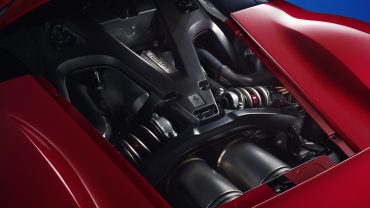
Strategic Insights
Ferrari’s F80 strategy reinforces the company’s luxury positioning through technological innovation and artificial scarcity. The combination of high unit pricing, limited supply, and strong demand for flagship models typically translates to improved average selling prices and enhanced profitability.
The supercar showcases Ferrari’s technology transfer capabilities from motorsports to road cars, particularly in electrification trends within the high-performance segment. This approach positions Ferrari as a leader in hybrid technology adoption among luxury automotive manufacturers.
Ferrari’s decision to develop electric motors in-house represents a strategic shift toward greater technological independence. This vertical integration enhances engineering capabilities while potentially improving margins on future electrified models.
Expert Opinions and Data
Analyst Nicolai Kempf emphasizes that investors should focus on 2026, when the F80 supercar reaches full market impact. He projects potential earnings forecast upgrades of approximately 5% for that year, reflecting the model’s significant financial contribution.
The F80’s performance specifications demonstrate Ferrari’s engineering prowess: acceleration from 0-100 km/h in 2.15 seconds, a top speed of 350 km/h, and over 1,000 kg of downforce at 250 km/h. The vehicle weighs 1,525 kg despite its carbon-fiber construction and advanced hybrid systems.
Technical innovations include motorsports-grade CCM-R Plus braking technology, active rear wing systems, and sophisticated drivetrain management software. These features highlight the increasing integration of advanced software and electronic systems in high-performance vehicles.
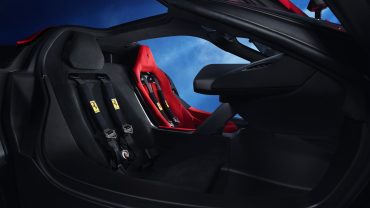
Conclusion
Deutsche Bank’s Ferrari upgrade reflects the automaker’s successful integration of advanced hybrid technology with luxury positioning and exclusivity strategies. The F80 supercar represents both technological achievement and financial opportunity, with deliveries scheduled to begin in 2025.
The combination of limited production, premium pricing, and strong institutional support positions Ferrari to capitalize on continued demand for ultra-exclusive, high-technology supercars. This approach strengthens Ferrari’s market leadership while supporting robust financial performance in an evolving automotive landscape.
